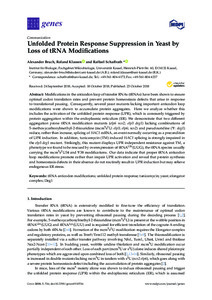| dc.date.accessioned | 2019-01-31T10:46:13Z | |
| dc.date.available | 2019-01-31T10:46:13Z | |
| dc.date.issued | 2018-10-23 | |
| dc.identifier | doi:10.17170/kobra-20190130129 | |
| dc.identifier.uri | http://hdl.handle.net/123456789/11051 | |
| dc.description.sponsorship | Gefördert durch den Publikationsfonds der Universität Kassel | |
| dc.language.iso | eng | |
| dc.rights | Urheberrechtlich geschützt | |
| dc.rights.uri | https://rightsstatements.org/page/InC/1.0/ | |
| dc.subject | tRNA anticodon modifications | eng |
| dc.subject | unfolded protein response | eng |
| dc.subject | tunicamycin | eng |
| dc.subject | yeast | eng |
| dc.subject | elongator complex | eng |
| dc.subject | Deg1 | eng |
| dc.subject.ddc | 570 | |
| dc.title | Unfolded Protein Response Suppression in Yeast by Loss of tRNA Modifications | eng |
| dc.type | Aufsatz | |
| dcterms.abstract | Modifications in the anticodon loop of transfer RNAs (tRNAs) have been shown to ensure optimal codon translation rates and prevent protein homeostasis defects that arise in response to translational pausing. Consequently, several yeast mutants lacking important anticodon loop modifications were shown to accumulate protein aggregates. Here we analyze whether this includes the activation of the unfolded protein response (UPR), which is commonly triggered by protein aggregation within the endoplasmic reticulum (ER). We demonstrate that two different aggregation prone tRNA modification mutants (elp6 ncs2; elp3 deg1) lacking combinations of 5-methoxycarbonylmethyl-2-thiouridine (mcm^5s^2U: elp3; elp6; ncs2) and pseudouridine (Ψ: deg1) reduce, rather than increase, splicing of HAC1 mRNA, an event normally occurring as a precondition of UPR induction. In addition, tunicamycin (TM) induced HAC1 splicing is strongly impaired in the elp3 deg1 mutant. Strikingly, this mutant displays UPR independent resistance against TM, a phenotype we found to be rescued by overexpression of tRNA^Gln(UUG), the tRNA species usually carrying the mcm^5s^2U34 and Ψ38 modifications. Our data indicate that proper tRNA anticodon loop modifications promote rather than impair UPR activation and reveal that protein synthesis and homeostasis defects in their absence do not routinely result in UPR induction but may relieve endogenous ER stress. | eng |
| dcterms.accessRights | open access | |
| dcterms.creator | Bruch, Alexander | |
| dcterms.creator | Klassen, Roland | |
| dcterms.creator | Schaffrath, Raffael | |
| dc.relation.doi | doi:10.3390/genes9110516 | |
| dc.type.version | publishedVersion | |
| dcterms.source.identifier | EISSN: 2073-4425 | |
| dcterms.source.issue | 9 | |
| dcterms.source.journal | Genes | |
| dcterms.source.pageinfo | 516 | |
| dcterms.source.volume | 2018 | |

